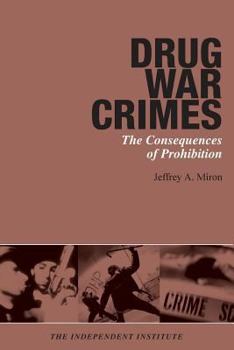Drug War Crimes: The Consequences of Prohibition
Select Format
Select Condition 
Book Overview
A balanced and sophisticated analysis of the true costs, benefits, and consequences of enforcing drug prohibition is presented in this book. Miron argues that prohibition's effects on drug use have... This description may be from another edition of this product.
Format:Paperback
Language:English
ISBN:0945999909
ISBN13:9780945999904
Release Date:March 2004
Publisher:Independent Institute
Length:130 Pages
Weight:0.50 lbs.
Dimensions:0.4" x 6.0" x 8.8"
Customer Reviews
4 ratings
Enough is Enough!
Published by Thriftbooks.com User , 13 years ago
Any objective observer can see that the United States' war on drugs is an epic failure. On the positive side, various states are taking the initiative in legalizing medical marijuana. On the other hand, the federal government still hasn't learned its lesson for decades. Short (107 pages), succinct, and backed by hard data, Miron's book presents a highly detailed critique of the U.S. government's war on drugs and the vast harm it has wrought. In addition, he makes the case for the only right alternative: full legalization of all drugs. Even if one doesn't agree with this conclusion, skeptics should read this book and understand that the approach and consequences of the status quo are unacceptable.
A FAILED WAR
Published by Thriftbooks.com User , 15 years ago
This is a book that every American needs to read. Recreational drug use is a very poor choice because it destroys free will and prevents individuals from being well-adjusted, happy, functioning members of society. However, the American "War on Drugs" is a failed war that empowers criminals and creates far more problems than it solves. As controversial as the position of legalization of drugs is, it is the only solution to removing the motivation for criminals to remain committed to creating generations of illegal drug users who fund their criminal empires. -Michael Jaquish (A retired law enforcement officer) Tales of a Country Cop in AfricaThe Role of the Security Officer: A Comprehensive Instruction Manual of Safety and Security for the Security Profession in America
Re-Legalize Now!
Published by Thriftbooks.com User , 15 years ago
"Drug War Crimes" is spot on. And we, the American People, would be best served by Re-Legalizing Marijuana Right Now! The MERP Model for Re-Legalization will destroy the Mexican Drug Cartels and much, much more. Please visit and post the following link far and wide. This subweb is both for understanding MERP and implementing MERP. We need everyones help on this. Get on the mailing list now! Let's Re-Legalize Marijuana in 2009 World Wide. MERP Headquarters The Marijuana Re-Legalization Policy Project (MRPP) http://www.newagecitizen.com/MERP.htm
At War With Ourselves
Published by Thriftbooks.com User , 19 years ago
The interesting thing about economics is the lack of emphasis on intention. Economists don't care what the intent of the policy is, only the outcome. The result of this all-consuming focus is that economic analyses have a fascinating way of seeing past wishful thinking. Nowhere is this more apparent than in Jeffrey Miron's analysis of narcotics prohibition, Drug War Crimes: the Consequences of Prohibition. Nearly everyone agrees that the United States has a drug problem, and our government arrests 1.5 million people a year fighting it. Is prohibition making the problem worse? Miron certainly thinks so. Although the book is nominally objective, Miron's personal opinions on the issue are clear. This is not necessarily a criticism - to paraphrase Howard Zinn's argument in A People's History of the United States, the large body of evidence that has been built up in support of drug prohibition compels a one-sided account in order to balance the scales. The argument goes like this: abridging the rights of citizens to use drugs is morally questionable in the first place; even if you decide that eliminating drug use is a noble aim of the government, the negative consequences of prohibition outweigh its positives; even if they didn't, outright prohibition is the worst way to go about achieving this goal. So why do we spend $33 billion a year on it? Many negative effects of drug use are self-evident, such as increased corruption, the spread of infectious disease through the sharing of needles, and the transfer of wealth to criminals. Two questions, however, warrant extended analysis: To what extent does prohibition lower consumption? And what is the effect of prohibition on violence? Miron's analysis suggests that prohibition reduces consumption by only about 20%, while leading to dramatic increases in violence. Some of these arguments are quite convincing, others aren't, while still others are neither, either due to moral subjectivity or to a lack of data. Nearly all of them, however, are thought provoking, and some are shocking. In an example rich with parallels to drug prohibition, Miron describes actions taken by the U.S. government during the 1920s. Knowing that individuals would attempt to use industrial alcohol to produce moonshine, congress ordered industries to change their method of alcohol production, making it unsuitable for ingestion. While their decision to poison their own citizens probably convinced some not to brew their own alcohol, thousands of others became ill or died. As an example of the tenor of Drug War Crimes, consider the section exploring the idea of rational drug. The section argues that the negative effects of many drugs have been widely exaggerated. In support of this assertion, Miron cites a study of the consumers of certain products, including narcotics. The study finds that the percentage of consumers still using narcotics five years after the study began is similar to that of many legal products.




